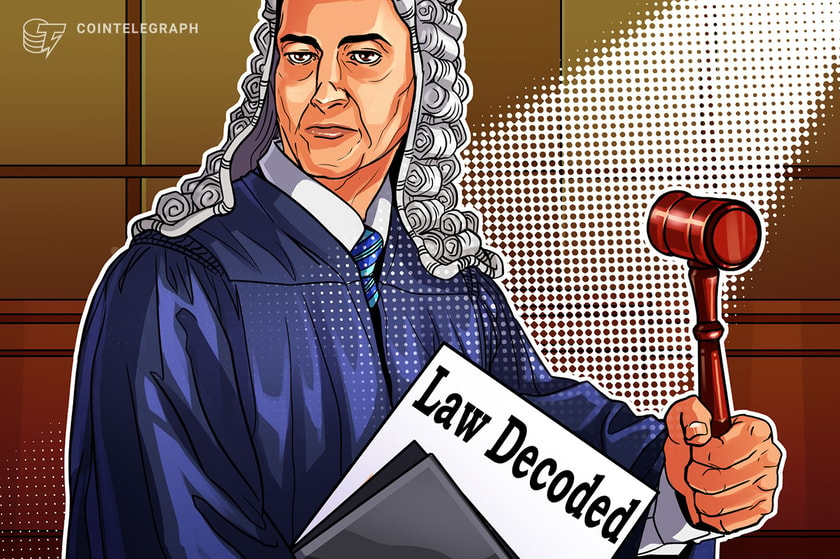
SBF claims innocence, contradicts other witnesses: Law Decoded

Sam Bankman-Fried was the final witness to take the stand after more than three weeks of testimonies in court.
Last week, the criminal trial of FTX founder and CEO Sam “SBF” Bankman-Fried continued in New York, with the man himself giving testimony as part of his defense. According to the SBF, he didn’t know any details about the creation of North Dimension, an alleged “shadowy entity” used to launder customer funds from the crypto exchange through Alameda Research. It was former chief regulatory officer Dan Friedberg who provided him with the papers setting up the firm, which he signed without question, SBF claimed.
Bankman-Fried denied knowing why crypto exchange FTX began moving user funds from a bank account with Alameda to North Dimension. He suggested that banks may have been more comfortable with North Dimension in order to avoid well-known hedge funds connected to crypto, such as Alameda.
The former CEO also suggested that Gary Wang, FTX’s former chief technology officer, had been partly responsible for creating the “allow negative” button for Alameda Research. The feature gave the crypto hedge fund the ability to trade more funds than it had available. “At the time, I wasn’t entirely sure what was happening,” Bankman-Fried said regarding Alameda’s line of credit. “I thought the funds were being held in a bank account or sent to FTX in stablecoins. If Alameda was keeping it, I figured it would be reflected as a negative number on FTX.”
Bankman-Fried’s claims partly or directly contradict the testimonies offered by Wang and former Alameda CEO Carline Ellison. Wang took the stand on Oct. 6, saying Bankman-Fried had ordered him and former FTX engineering director Nishad Singh to implement the “allow negative” feature in 2019. Ellison testified that she had wanted to step down as CEO of Alameda, but SBF asked her to stay, citing the risk of rumors about the firm’s financial health.
Californian lawmakers want to cap crypto ATM withdrawals at $1,000 daily
California legislators have proposed the Digital financial asset transaction kiosks bill, which seeks to impose a cap on crypto ATM withdrawals of $1,000 per day in light of growing scams. Additionally, starting in 2025, the law would limit operators’ fees to $5 or 15% (whichever is higher). The bill, if approved, would come into effect on Jan. 1, 2024. The bill was introduced after legislative members visited a crypto ATM in Sacramento and found markups as high as 33% on some crypto assets compared with their prices on crypto exchanges. On average, a crypto ATM charges fees between 12% and 25%, according to a legislative analysis.
Cynthia Lummis calls for DOJ action against Binance and Tether
United States Senator Cynthia Lummis has called on the U.S. Department of Justice (DOJ) to consider charges against crypto exchange Binance following the terrorist group Hamas’ attack on Israel. In a letter to U.S. Attorney General Merrick Garland, Lummis and Arkansas Representative French Hill urged Justice Department officials to “reach a charging decision on Binance” and “expeditiously conclude” investigations of allegedly illicit activities involving Tether.
“We urge the Department of Justice to carefully evaluate the extent to which Binance and Tether are providing material support and resources to support terrorism through violations of applicable sanctions laws and the Bank Secrecy Act,” said Lummis and Hill.
Crypto firms have breached new U.K. promo rules 221 times
The United Kingdom Financial Conduct Authority (FCA) claims that since the Oct. 8 crypto promotion rules came into place, firms are still failing to provide visible enough risk warnings and adequate information about risks and are making claims about the safety, security or ease of using crypto without highlighting the risks involved. Crypto-promoting firms have breached the new rules at least 221 times since coming into force, the FCA claims. While many of the FCA’s crypto-related alerts appear to be illegitimate schemes offering high-yield returns on crypto investments, the FCA has taken action against seemingly legitimate businesses as well.
Go to Source
Author: David Attlee









